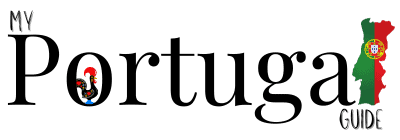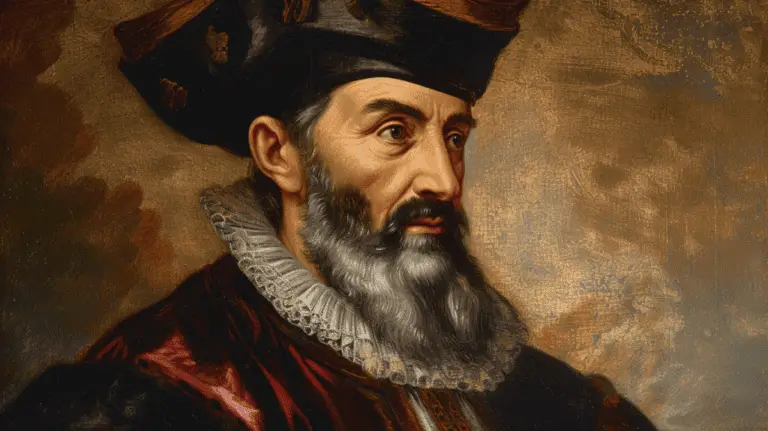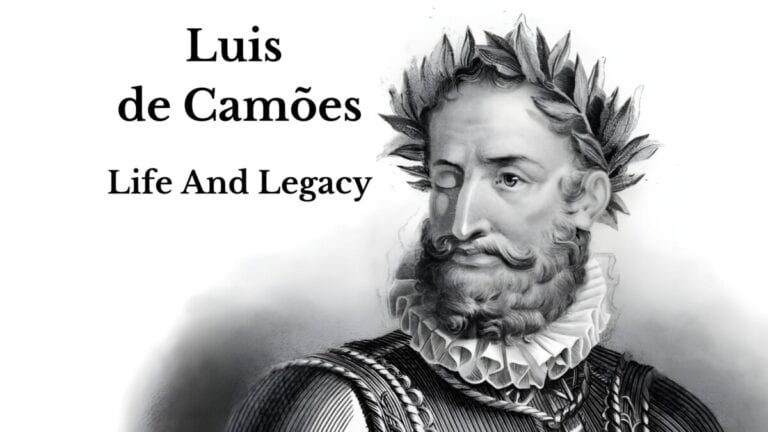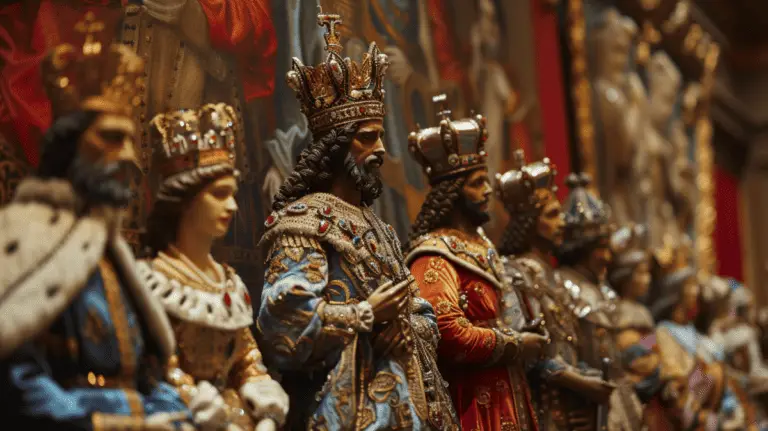Carnation Revolution – 25th April 1974
As Portugal approaches the 50th anniversary of the Carnation Revolution on April 25th, 2024, this momentous occasion marks half a century since the nation embarked on its remarkable journey towards democracy and freedom. The golden jubilee serves as a poignant reminder of the power of peaceful revolution and the enduring legacy of those who ushered in a new democratic era for Portugal.
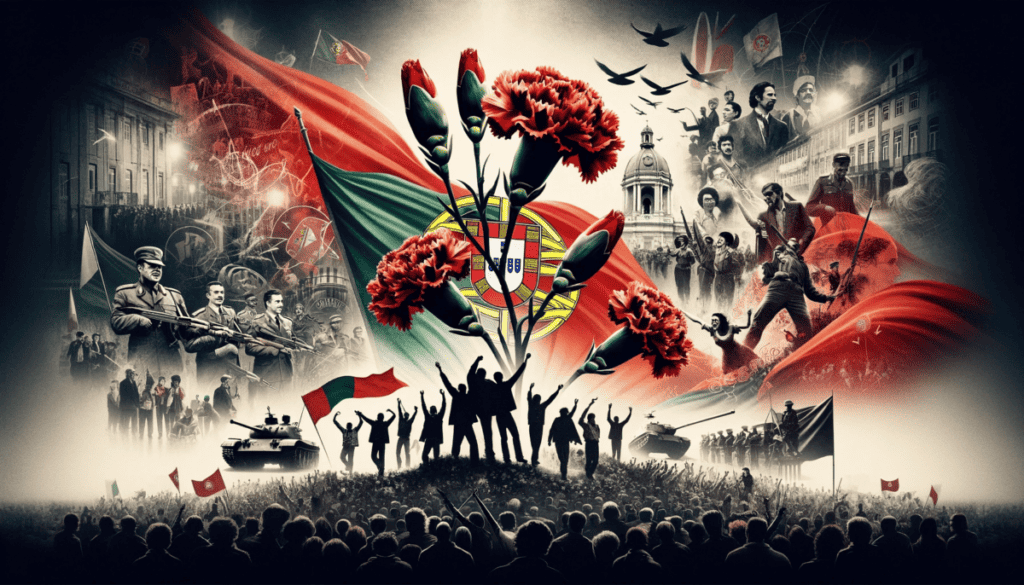
Background: Portugal Under the Estado Novo Regime
Prior to the revolution, Portugal was gripped by the authoritarian Estado Novo regime, established by António de Oliveira Salazar in 1933. The regime imposed strict censorship, relied on a ruthless secret police force, and stifled political dissent, creating a climate of fear and repression. Economically, Portugal remained largely underdeveloped and stagnant compared to its European neighbors. Widespread poverty, high illiteracy rates, and discontent created conditions ripe for revolution.
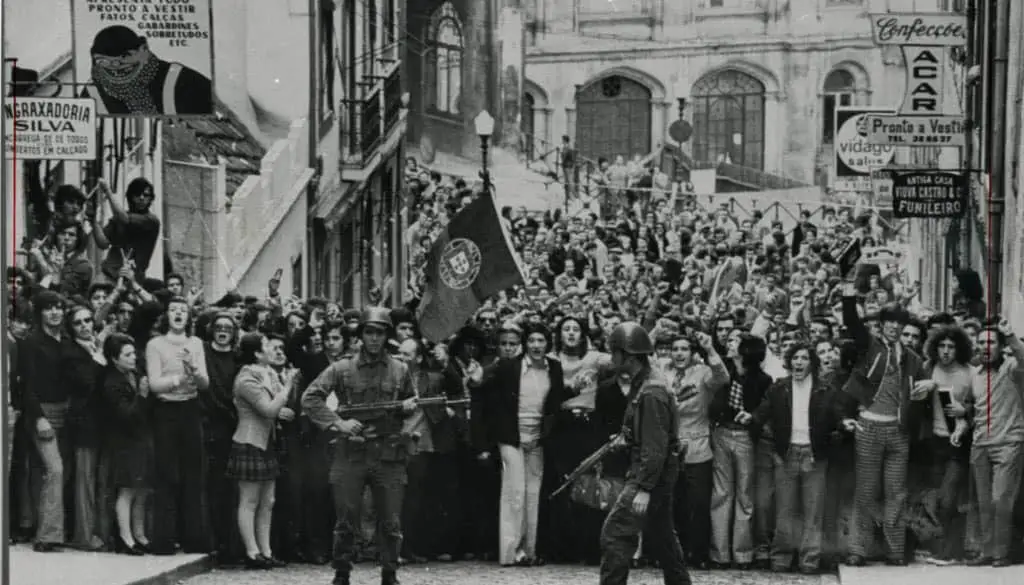
The cornerstone of the Estado Novo system was a staunch nationalism and conservative Catholicism. Salazar crafted a narrative of national greatness, invoking Portugal’s imperial past and Age of Discovery. However, this nostalgic nationalism was at odds with the reality of Portugal’s position in the 20th century. While regimes across Europe moved towards democracy and human rights, the Estado Novo stubbornly held on to its authoritarian structures.
The regime’s secret police, the PIDE (Polícia Internacional e de Defesa do Estado), was central to suppressing opposition through its extensive surveillance and arbitrary detention powers. The breadth of PIDE’s oppressive reach ensured that fear permeated everyday life, making any dissent a dangerous proposition. This repression meant the regime faced little organized opposition until the late 1960s.
Catalysts of the Revolution
Colonial Wars
Portugal’s costly and unpopular colonial wars in Africa proved to be a significant drain on resources and morale. These wars began in the 1960s as independence movements grew strength in Portugal’s African colonies. Determined to hold on to its imperial possessions, Portugal committed significant resources and manpower to fighting independence movements in Angola, Mozambique, and Guinea-Bissau.
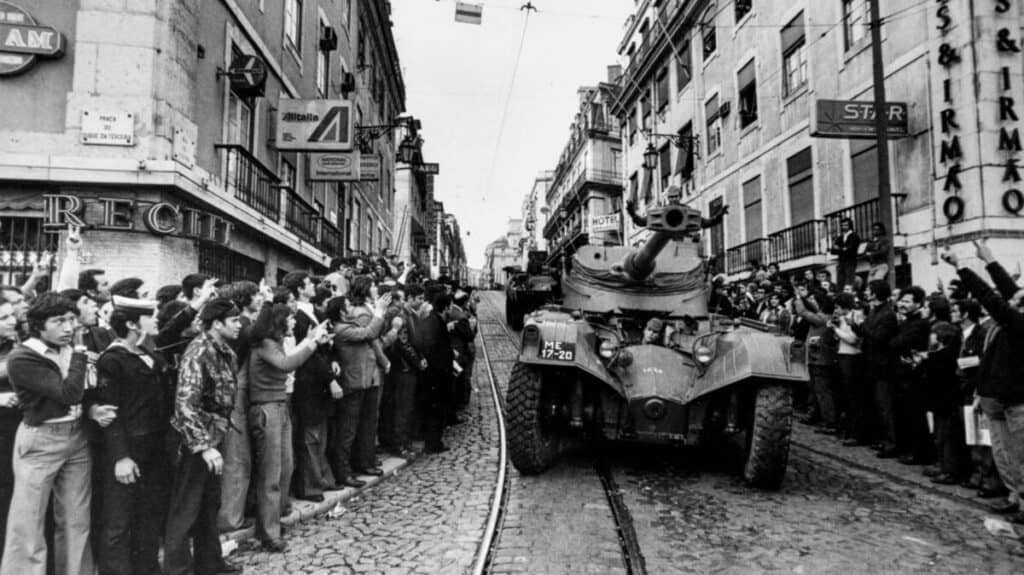
The human cost was immense, as hundreds of thousands of Portuguese conscripts faced the burden of fighting seemingly endless and unjust wars thousands of miles from home. This futile effort led to disillusionment within the military ranks, fueling dissent against the regime and its stubborn colonial policies. Much of this dissent began brewing among younger officers who had witnessed the horrors of the colonial wars first-hand.
Underground Opposition
Though banned under the Estado Novo, underground political parties like the Socialist Party (PS) and Communist Party (PCP) slowly organized networks of dissent and opposition from the late 1960s. Their covert activities involved mobilizing regime critics, circulating illegal literature, and nurturing solidarities among the populace. This laid the groundwork for the pluralistic political landscape that would emerge after the revolution.
The PCP, in particular, played a leading role in coordinating and supporting labor strikes across Portugal in the early 1970s. These strikes, though risky, succeeded in channeling popular discontent against economic hardship. The modernizing influence of the PS was also significant, as it advocated social democracy and aligned itself with the mainstream left across Europe.
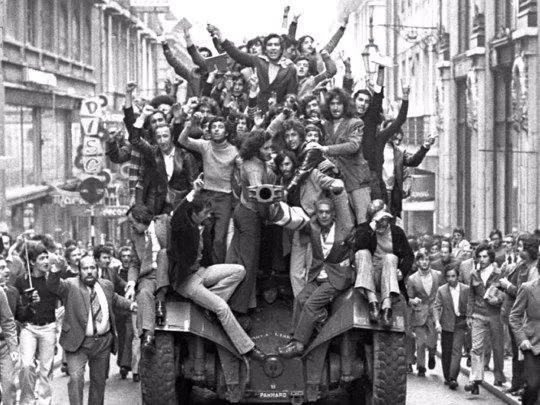
The Armed Forces Movement
The Movimento das Forças Armadas (MFA) evolved from an informal group of officers addressing military concerns into an organized body ready to initiate radical political change. Many MFA leaders had experienced the colonial wars first-hand, giving the movement moral authority when speaking against the regime. Though starting as a reaction to issues like pay and conditions, the MFA came to see the colonial wars as symptomatic of the wider ills plaguing Portuguese society.
TheBackground and motivations of MFA members were diverse, spanning various ideological positions. But they found common ground in the need to overthrow what they saw as a bankrupt regime under Caetano’s leadership. Through a series of clandestine meetings and careful planning, the MFA transformed itself into the prime mover behind the events leading up to April 25, 1974.
International Pressure
Internationally, Portugal faced growing criticism and sanctions over its colonial stance from both allies and adversaries. Portugal’s continued embrace of colonialism was seen as an embarrassment and anachronism within NATO and the UN, as it bucked the trend towards self-determination. The country faced a barrage of criticism for human rights abuses and exploitation of indigenous peoples within its colonies.
This international isolation worsened domestic economic troubles and challenged the political legitimacy of the regime on the world stage. The perception that the regime was detached from reality at home and abroad fueled the impetus for radical change.
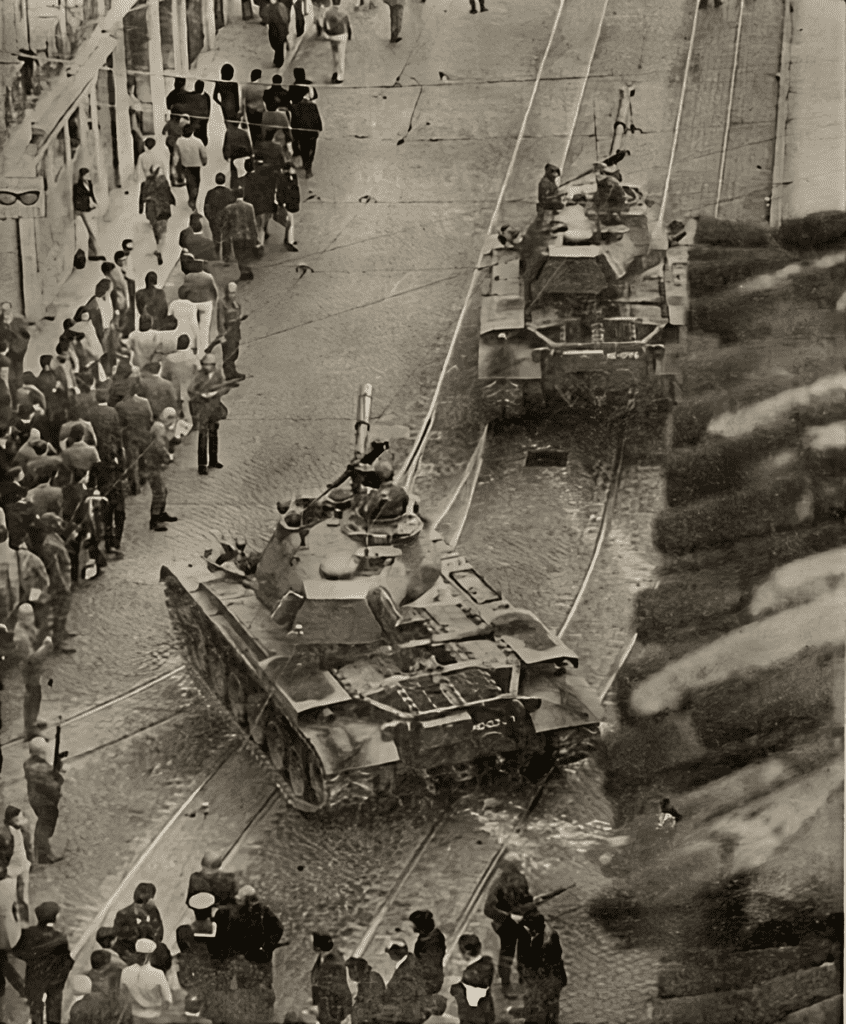
Key Figures and Groups
- Marcello Caetano: Salazar’s successor, Caetano attempted some reforms after 1968 but largely continued the repressive policies of his predecessor. His ineffective leadership intensified demands for change. His downfall marked the end of the regime.
- Oliveira Salazar: Though gone from power since 1968, Salazar’s legacy and repressive structures remained firmly in place under Caetano. Salazar’s era was synonymous with the oppression against which the revolutionaries rallied.
- General António de Spínola: A prominent MFA leader who later became Portugal’s first post-revolution President. His moderate royalist sympathies balanced the leftist tendencies of other MFA members.
- MFA: This group of junior military officers, many veteransof the colonial wars, carefully planned the coup and ensured its peaceful success through political astuteness.
- PCP: The underground Portuguese Communist Party played a leading role in organizing labor unrest under the Estado Novo. Its influence grew significantly in shaping post-revolution policies.
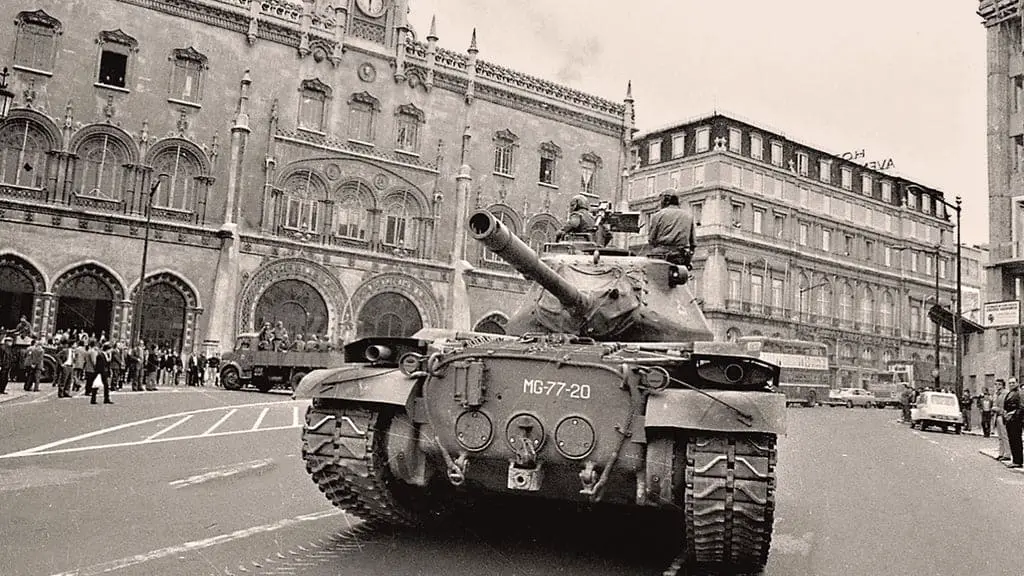
The Revolution: From Coup to Democracy
In the early hours of April 25, 1974, the MFA set its long-planned coup into motion. Troops swiftly moved to occupy key installations in the capital Lisbon, including government ministries, radio stations, and airports. The coup leaders took great pains to ensure the action proceeded swiftly and with minimal bloodshed. Soldiers placing carnations into their rifle barrels became an iconic image, signaling the peaceful intentions underpinning the events.
Remarkably, the authoritarian regime that had ruled Portugal for decades collapsed within hours, with little resistance. By dusk, a new chapter had opened in Portugal’s history as Marcello Caetano resigned and his regime extinguished. This relatively peaceful transition stood in stark contrast to the violence and chaos that had accompanied regime changes elsewhere.
In the aftermath of the coup’s success, the MFA’s Junta assumed a caretaker leadership role alongside President Spínola. Though Spínola favored a more gradual transition, the MFA moved swiftly to implement sweeping reforms. Censorship mechanisms were abolished, political prisoners released, and exiled dissidents invited to return. Crucially, the independence process began for Portugal’s African colonies, signaling an end to the costly colonial era.
The period also saw an explosion in political activity, as new parties emerged across the ideological spectrum. The once-clandestine PCP and PS now operated openly, competing for influence with newly formed conservative and socialist groups. This pluralistic political landscape reflected the democratic aspirations unleashed by the revolution.
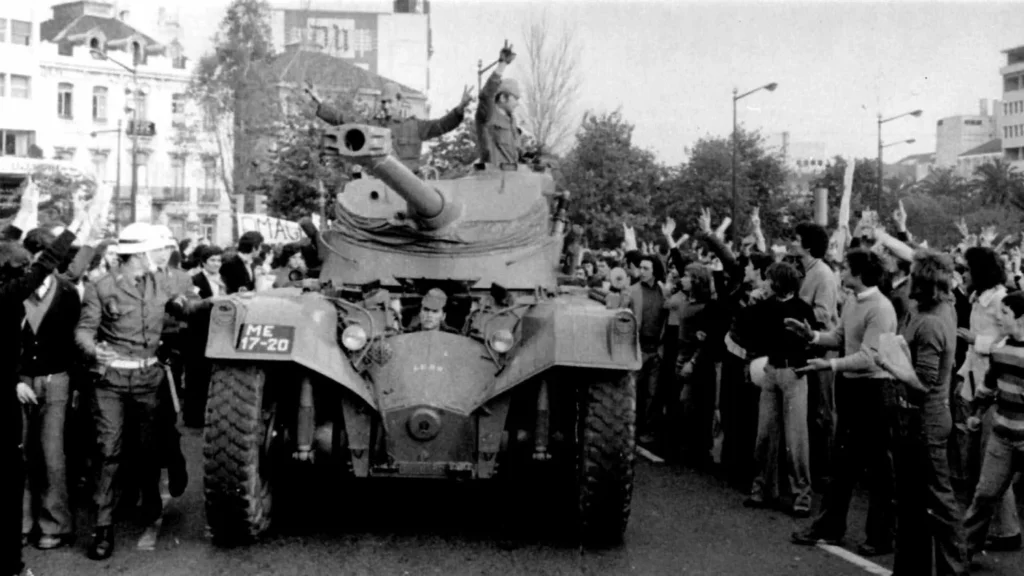
By 1975, the initial post-coup coalition had begun fracturing over the pace of reforms. Hardliners within the MFA wanted swifter socialization, while moderates argued for measured change. A turbulent period followed, marked by provisional governments, failed counter-coups, and a tense standoff between moderate and radical revolutionaries.
However, by 1976, the moderates gained the upper hand, culminating in the April 1976 election won by the PS under the leadership of Mário Soares. This success confirmed popular support for social democracy over radical left alternatives advocated by factions of the MFA. It marked a crucial moment cementing parliamentary democracy in Portugal.
Carnation Revolution April 25, 1974 – Hour By Hour
24th April 1974
10:55 PM – The song “E Depois do Adeus” by Paulo de Carvalho is played on the radio at 10:55 PM, serving as the first secret signal for the coup to begin
25th April 1974
12:20 AM – MFA sieze control of the national radio station, then the second secret signal “Grândola, Vila Morena” played on Radio Renascença, indicating the military coup was underway. This song by Zeca Afonso became an anthem of the revolution.
12:30 AM – The MFA began mobilizing across Lisbon, as preset military units occupied key strategic locations. These included the airport, government ministries, radio stations, telephone exchange, and the headquarters of the secret police PIDE.
3:00 AM – MFA had shut down airports in Lisbon and Porto, rerouting flights to Spain, seized key radio stations and their transmitters, and also took over the military headquarters in Oporto.
03:20 AM – Captain Fernando Salgueiro Maia leaves Santarem in a convoy of 10 vehicles and 240 men and head to Lisbon arriving at 05:30am
04:20 AM – MFA make a public broadcast over national radio advising people stay home. Meanwhile, healthcare workers were requested to proceed with their duties at hospitals as normal. The announcement also included guidance for on-duty soldiers, advising them to refrain from engaging in any confrontations with MFA forces
5:00 AM – With the radio stations under their control, the MFA begins broadcasting messages urging people to stay off the streets and remain calm. The coup leaders affirm this is not a power grab but a move to restore democracy.
7:30 AM – More troops fan out across Lisbon to occupy further military facilities and key infrastructure like bridges. Citizens cautiously begin gathering on the streets as news spreads.
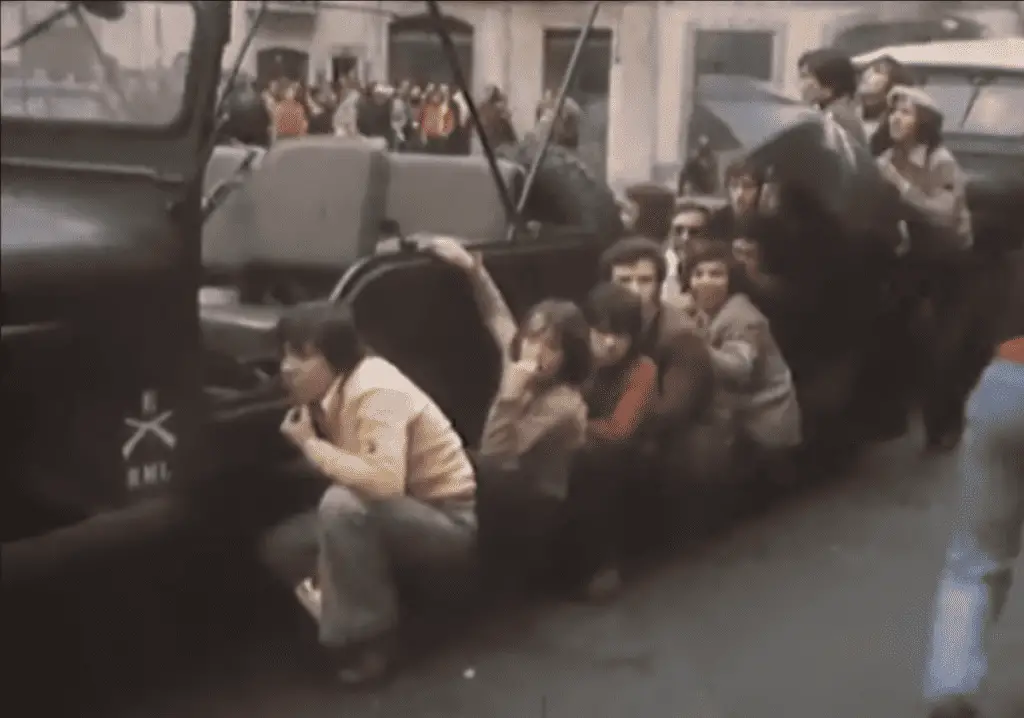
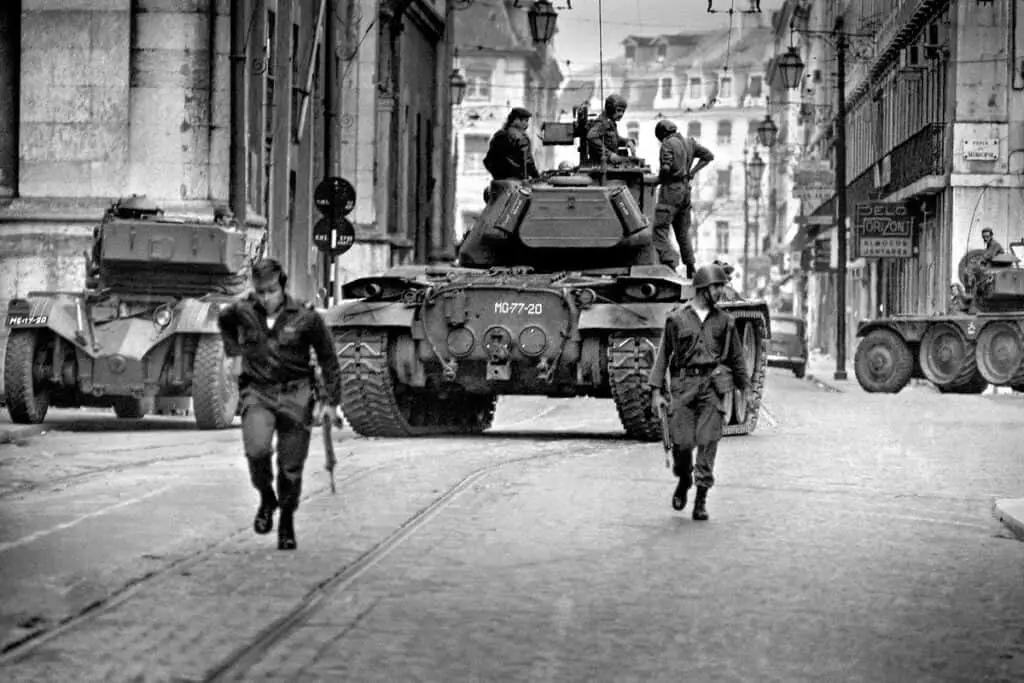
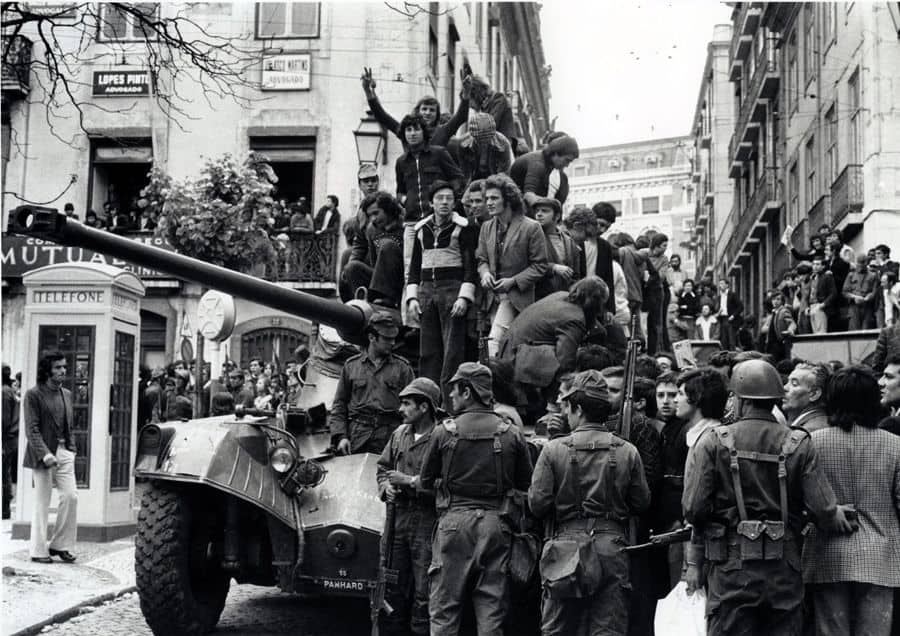
9:00 AM – Rebel military units arrive at São Bento, the parliamentary palace, to arrest government ministers. Prime Minister Caetano surrenders and is transported to a military base.
10:00 AM – Celeste Caeiro gave out Carnations to soldiers after seeing that the restaurants were closed. Placing flowers in gun barrels emerges as a symbolic gesture of a peaceful, “flower power” revolution.
10:30 AM – General Spínola makes a broadcast announcing the overthrow of the regime and the formation of a military junta committed to democratization. The crowd cheers openly upon hearing this news.
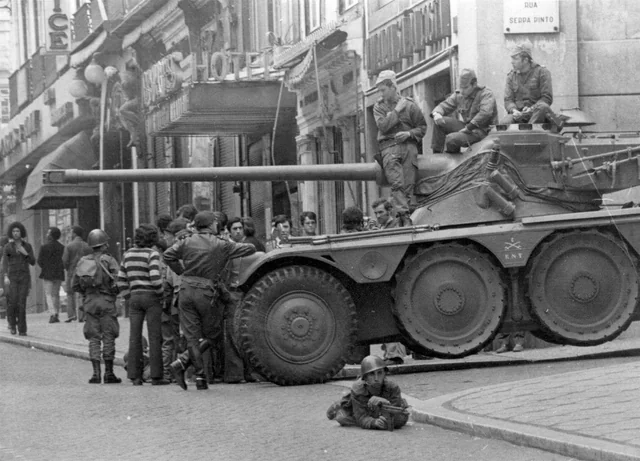
12:30 PM – Captain Maia surrounds the GNR barracks at the Largo do Carmo where Ministers and Marcello Caetano “President of the Council” had withdrawn too.
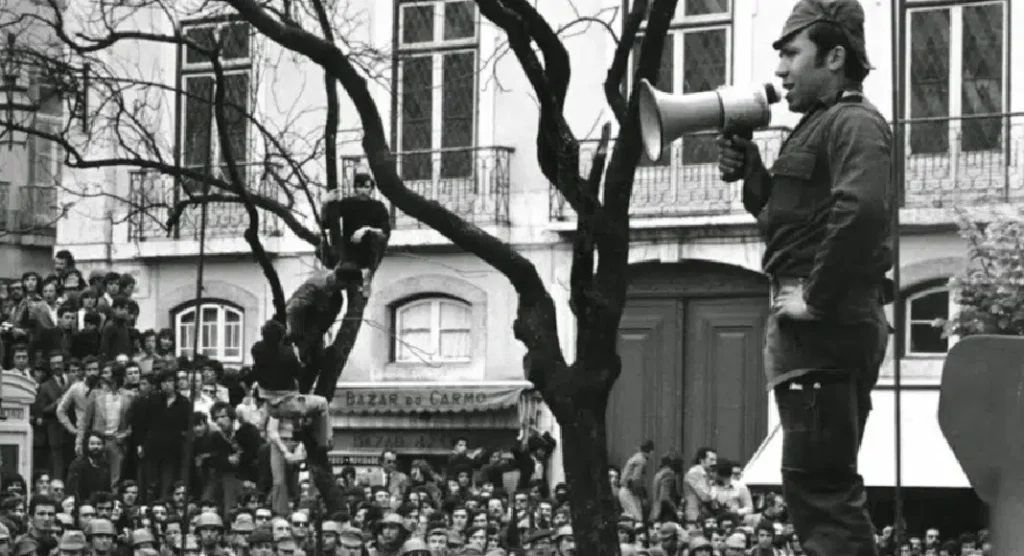
4:30 PM – The MFA allows Marcello Caetano safe passage into exile. His rule has collapsed in the span of a day with minimal violence and casualties from the coup action.
5:30 PM – New leader General Spínola arrives in Lisbon to widespread jubilation. The city starts celebrating the end of the dictatorship as citizens take to the streets in joy and wonderment. A new era has begun for Portugal.
11:30 PM – The Junta de Salvação Nacional (JSN) appeared on TV (RTP), pledging to restore power to the civilian population following the conduct of free elections.
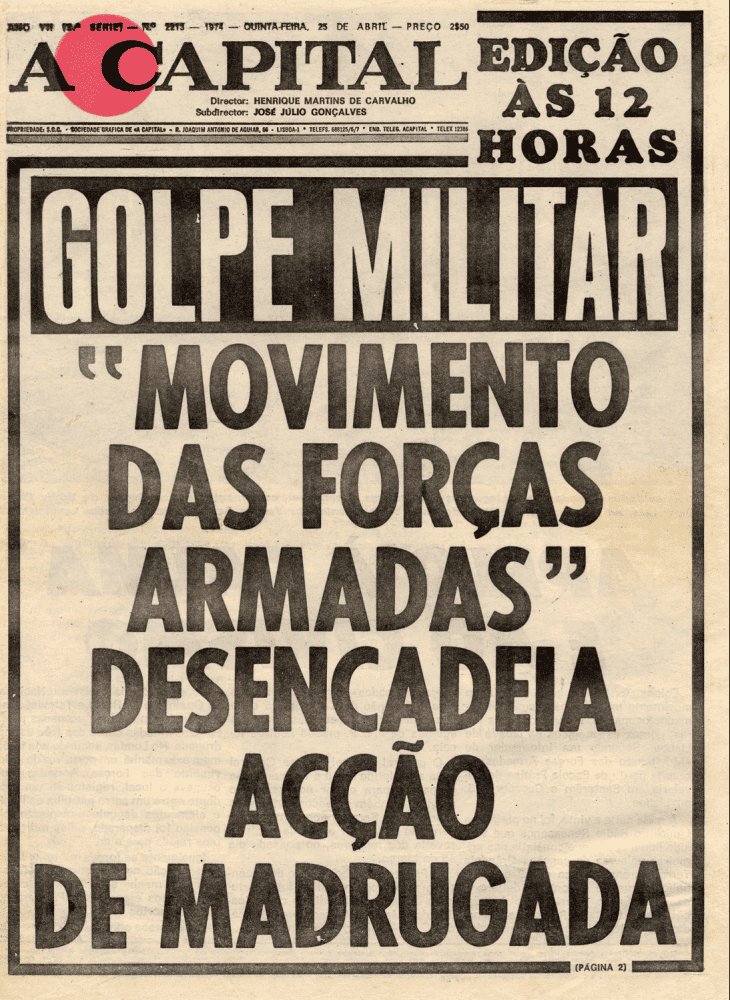
Click on the image to read the whole newspaper (In Portuguese)
Impacts and Legacy
The Carnation Revolution represented a tectonic shift for Portugal’s political development. Within two years, the apparatus of dictatorship had been completely dismantled and replaced with democratic governance. The effects on economy, society, culture, and global relations were profoundly transformative.
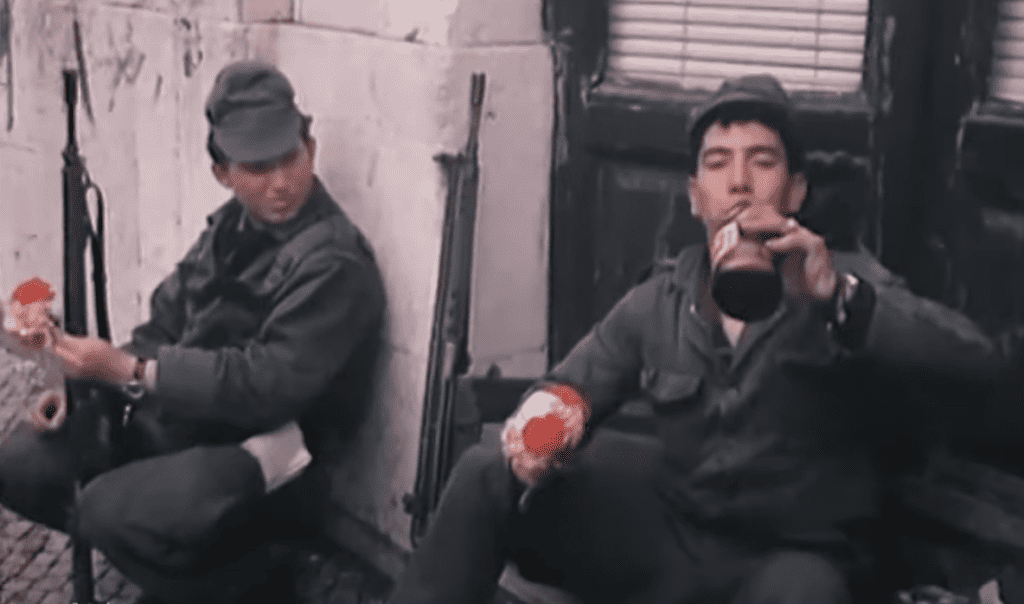
Political Liberalization
The new Constitution of 1976 enshrined human rights, civil liberties, and mechanisms of democratic accountability. Pre-revolution restrictions on assembly, expression, and political participation gave way to their unprecedented flourishing. The oppressive PIDE apparatus was abolished. These developments allowed the Portuguese public sphere to be reshaped by openness and pluralistic debate.
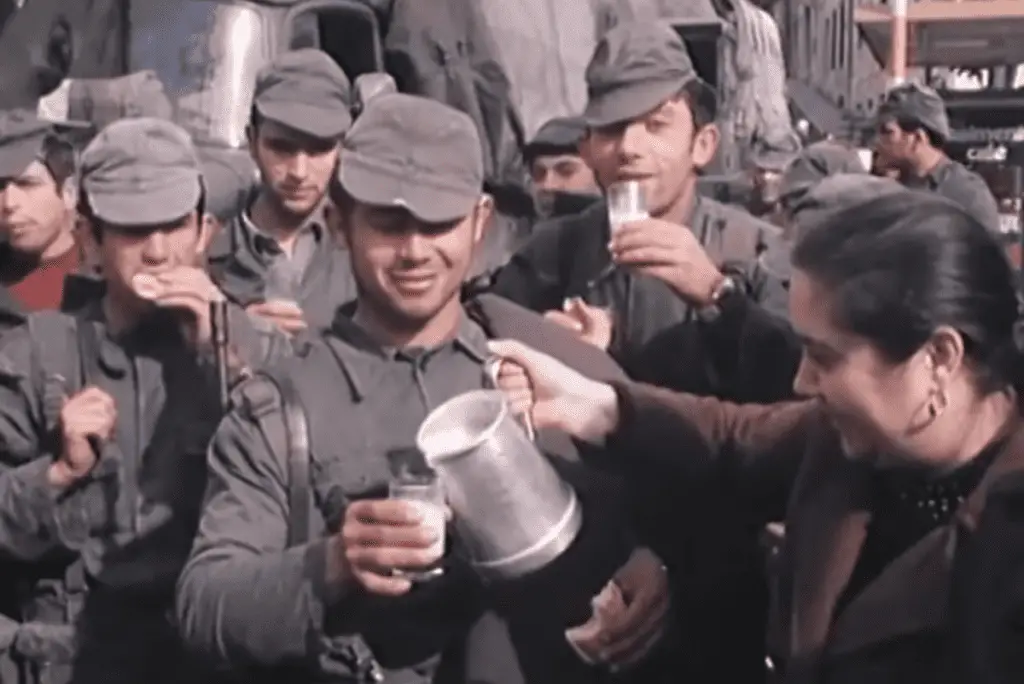
Decolonization
Portugal’s African colonies rapidly gained independence in the wake of the revolution, fundamentally shifting the global political map. This marked the end of Portugal’s centuries-old colonial empire in Africa and Asia. While disruptive in the short-term, decolonization allowed Portugal to normalize relations with newly independent countries like Angola and Mozambique.
Economic Growth
Departing the “corporatist” model of the Salazar years, Portugal saw economic expansion under democratic governance. Though some industries were initially nationalized, subsequent privatization and Portugal’s entry into the EEC created investment and growth. Social reforms also distributed resources more equitably.
Cultural Renaissance
Freed from the shackles of censorship, the cultural realm blossomed with unprecedented creativity and artistic experimentation. Contemporary Portuguese music, cinema, and literature embraced themes of identity, democracy, decolonization, and social change. The revolutionary period has become a rich source of inspiration for later generations of artists and writers seeking to understand this turbulent but fruitful period.
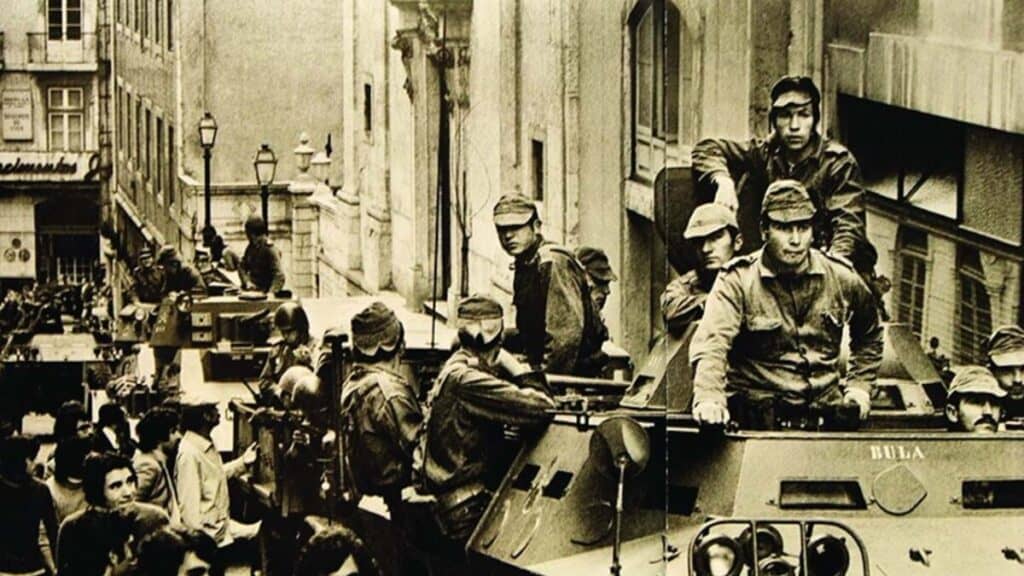
International Reputation
Internationally, the peaceful Carnation Revolution represented a remarkable political triumph that boosted Portugal’s standing. The country progressed from pariah status under the Estado Novo to a respected young democracy and progressive voice within the international community. Portugal pursued greater European integration, joining the EEC in 1986.
Lasting Memory
The revolution remains etched in public memory through commemoration and scholarship. April 25 is celebrated as Freedom Day, marking Portugal’s transition to democracy. The 70s revolutionary period continues to be analyzed by historians and informs modern politics and culture. Films, books, and images from that period have entered the national consciousness.
For Portuguese society, the revolution represented a dramatic break from insular authoritarianism to opening up as a modern European democracy. This turning point unequivocally proved that positive change was possible through collective action.
While stability was sometimes elusive in the volatile initial period, consolidation eventually prevailed over radicalization. Measured change triumphed over extremes on the left and right, allowing Portugal to realize the original promise of the revolution by institutionalizing democracy.
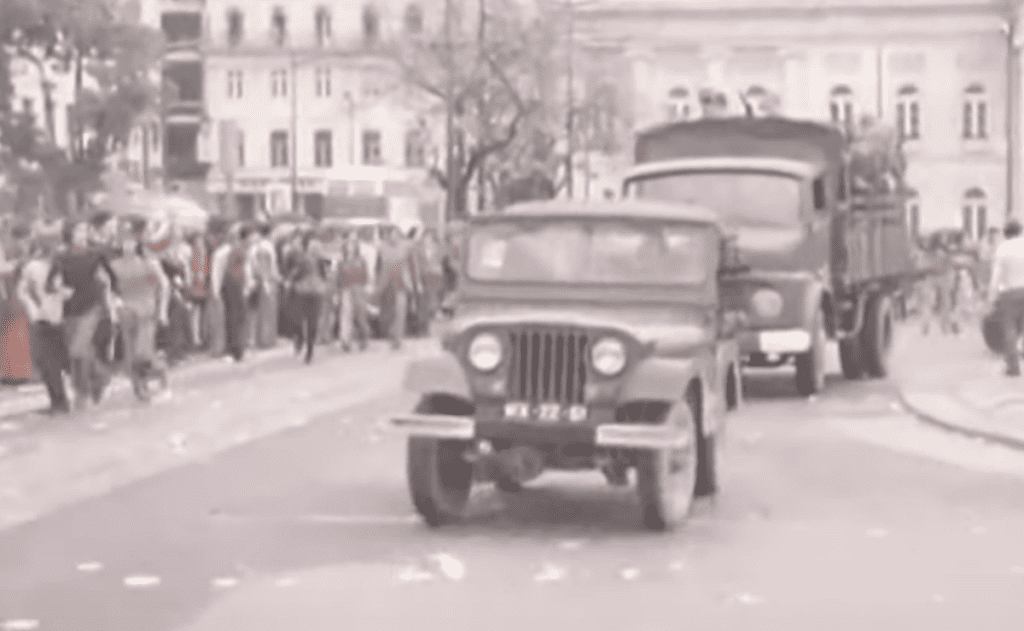
Key Protagonists of the Revolution
The Carnation Revolution resulted from the brave actions of several pivotal groups and individuals who cemented their place in history by bringing down a dictatorship and ushering in democracy.
- Mário Soares – Soares led the Socialist Party from exile under the regime. As Prime Minister from 1976, his democratic credentials gave moderates credence over radical leftists. His measured governance ensured consolidation of democratic institutions.
- General Spínola – Spínola’s early leadership lent the MFA vital legitimacy. Though later marginalized for his centrist instincts, his advocacy of an orderly transition was crucial in the initial post-coup phase.
- Álvaro Cunhal – As leader of the Portuguese Communist Party, Cunhal skillfully mobilized popular support for the revolution. However, his maximalist politics alarmed moderates.
- Melo Antunes – A revolutionary captain and leftist intellectual, Antunes authored the document outlining demands for regime change. His eloquent voice embodied the original MFA spirit.
- Captain Salgueiro Maia – Captain Maia was the central planner behind the MFA’s military strategy and his coordination was essential to the Carnation Revolution’s dramatic success with minimal violence. His contribution was hugely significant but not always recognized, as some higher-ranking MFA figures received more public attention.
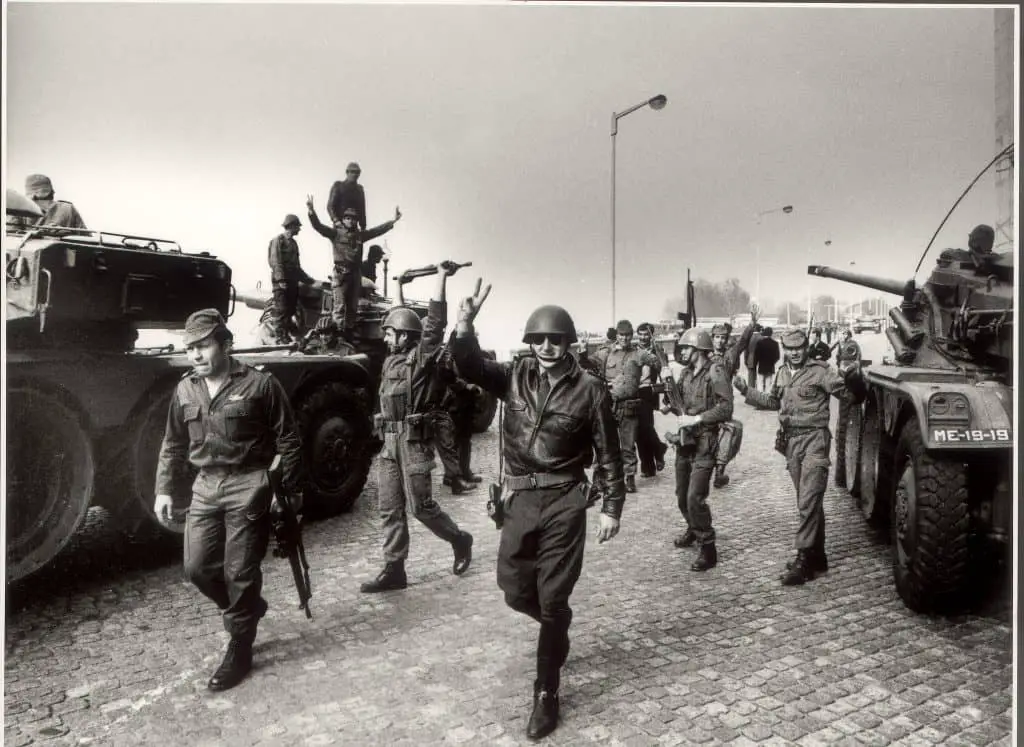
The MFA Coordinating Committee
This clandestine cell within the MFA planned the April 1974 coup with meticulous care to pre-empt resistance and safeguard human life. Their strategic skill was key to the revolution’s success.
The Revolution’s Enduring Significance
Half a century later, the remarkable legacy of the Carnation Revolution persists in shaping contemporary Portugal. Its 50th anniversary is a milestone to honor the progress made and reinforce commitment to the democratic values born from the events of April 1974.
Most importantly, the peaceful transition stands as an inspiring model of principled reform overcoming entrenched authoritarianism. It proved definitively that positive change can arise from moral conviction and collective struggle. This lesson remains timeless and universal.
For Portugal, the revolution represented a newfound summoning of democratic will – a definitive choice of liberty that has endured through the subsequent decades. The nation affirmed its European identity grounded in freedom and human dignity.
This anniversary is a poignant moment to commemorate the women and men whose sacrifices remade Portugal for the better. Their vision and courage in confronting oppression still lights the path forward today. By honoring the past, Portugal renews its pact with the future.
Sources Used For This Article:
- https://www.newworldencyclopedia.org/entry/Portugal
- Ernesto Castro Leal, & Translated by Richard Correll. (2016). The Political and Ideological Origins of the Estado Novo in Portugal. Portuguese Studies, 32(2), 128–148. https://doi.org/10.5699/portstudies.32.2.0128
- A People’s History of the Portuguese Revolution By Raquel Varela
- Helena Sousa “Recent Political History of Portugal”. University of Beira Interior
- Association for Diplomatic Studies and Training. “The Carnation Revolution – A Peaceful Coup in Portugal”.
- Sebastián Royo. (2018). Introduction: Portugal, Forty-Four Years after the Revolution. Portuguese Studies, 34(1), 5–19. https://doi.org/10.5699/portstudies.34.1.0005
